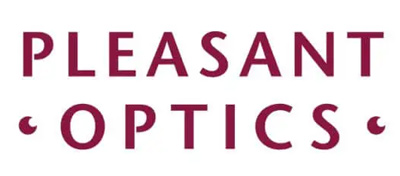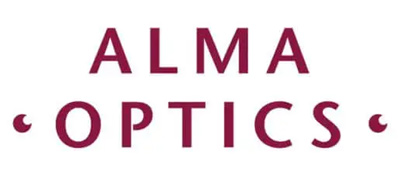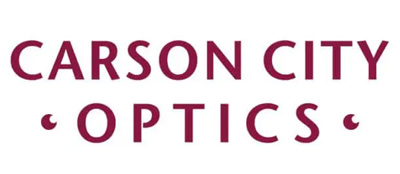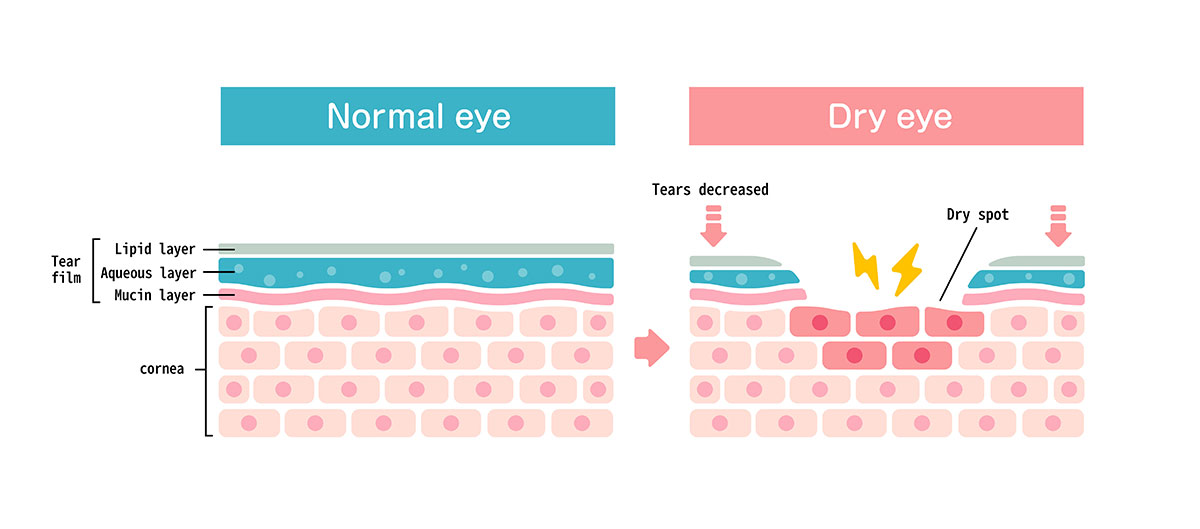Dry Eye Specialist

Find relief from dry, itchy, burning eyes
Are your eyes constantly dry and gritty like there’s sand in them? We’ve all experienced dry, red, and watery eyes at some point in our lives, whether it was from staring at screens or living in a dry or windy climate. However, for some people, dry eyes can be a daily struggle. In some cases, artificial tears may provide relief, but they only treat the symptoms and not the underlying problem. Our dry eye specialists in Mt. Pleasant, St. Louis, Carson City, and Alma, Michigan can identify the root cause of your symptoms and help you find lasting relief.
What is dry eye?
Dry eye happens when your eyes aren’t getting enough moisture. This could mean your eyes aren’t producing enough tears or your tears aren’t the right quality. Dry eye can make it difficult for some people to do daily tasks, such as reading or working on computers, while others experience severe pain and discomfort. If left untreated, dry eye can damage your cornea (the outermost, clear layer of your eye) and affect your vision in severe cases.
Common causes of dry eyes
One common and often overlooked cause of dry eye is meibomian gland dysfunction (MGD). The meibomian glands are tiny oil glands located along the edge of your eyelids. Their main function is to produce an oil called meibum that helps lubricate the surface of your eyes and prevent tears from evaporating too quickly. When these glands become blocked or dysfunctional, it can result in a lack of oil production and poor-quality tears, leading to dry eye symptoms.
Other causes of dry eye include:
- Hormonal changes during pregnancy and menopause
- Taking certain medications such as antihistamines, diuretics, and antidepressants
- Certain diseases such as rheumatoid arthritis, Sjögren’s syndrome, lupus, and thyroid disease
- Blepharitis (when your eyelids are swollen or inflamed)
- Wearing contact lenses for a long time
- Spending time in a smoky, windy, or dry environment
- Looking at a computer screen for too long, reading, or doing other activities that cause you to blink less
- Having refractive eye surgery such as LASIK
What are the symptoms of dry eye?
Common signs of dry eye include:
- A burning, stinging, gritty sensation
- Red, itchy, irritated eyes
- Watery eyes
- Blurry vision
- Light sensitivity
- Stringy mucus near the eyes
- Trouble wearing contact lenses
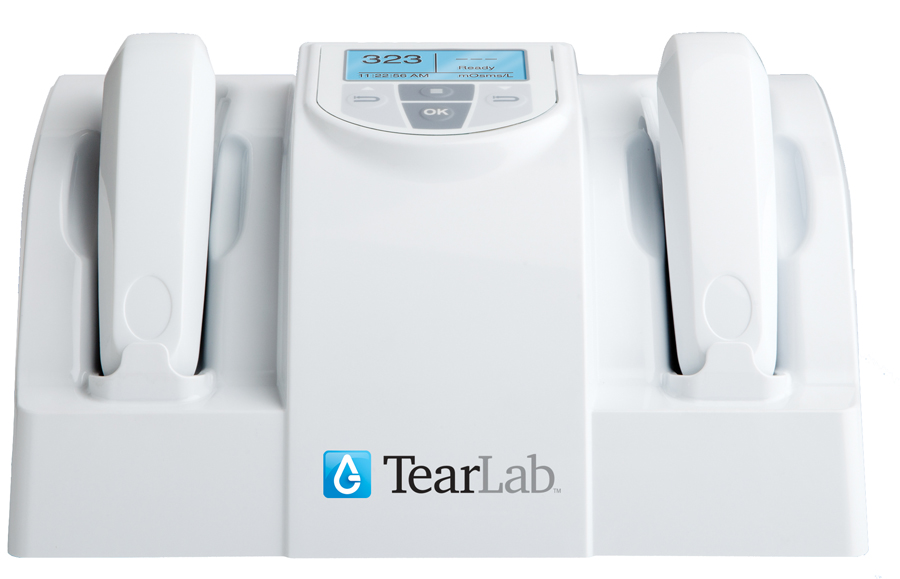
How is dry eye diagnosed?
Our eye doctors use advanced diagnostic tools to help us diagnose dry eye and determine the best course of treatment for your specific needs. One of the tools we use is TearLab, which is a device that measures the osmolarity of your tears. Tear osmolarity is a measurement used to determine how much salt is in your tears. If your tear osmolarity is high, you are more likely to have dry eye.
We may also use meibomian gland imaging to assess the health of these tiny glands in your eyelids that make an essential part of your tears. By taking high-resolution images of these glands, we can detect blockages and inflammation that may be contributing to your dry eye symptoms. This technology not only helps us diagnose dry eye, but it can also help us keep track of how the condition is progressing and how well treatment is working. By taking regular images over time, our doctor can see if your treatment plan is effective and adjust it as needed to make sure you’re getting the best care possible.
How do you treat dry eye syndrome?
Living with dry eye can be uncomfortable and frustrating, and our experts are here to help you find lasting relief. Depending on the root cause and severity of your symptoms, we may recommend artificial tears, prescription medications to reduce inflammation, or lifestyle changes such as taking breaks from screens and staying hydrated.
We also offer at-home therapies that can complement your treatment plan and provide relief from dry eyes. These may include warm compresses, blinking exercises, eyelid hygiene techniques, and nutritional supplements that promote healthy tear production. We may recommend avoiding wearing contact lenses for a certain amount of time or trying a different type or brand of contact lenses.
Dry eye clinic
Dry eye syndrome is a common and growing health issue that affects people all around the world. While artificial tears and home remedies can provide some relief for mild cases, sometimes they aren’t enough. If you’ve been struggling with persistent dry eyes despite trying various treatments on your own, it may be time to schedule an appointment at our dry eye clinic. Our dry eye specialists, Dr. Keller and Dr. Couch, offer advanced treatment options when other treatments are ineffective:
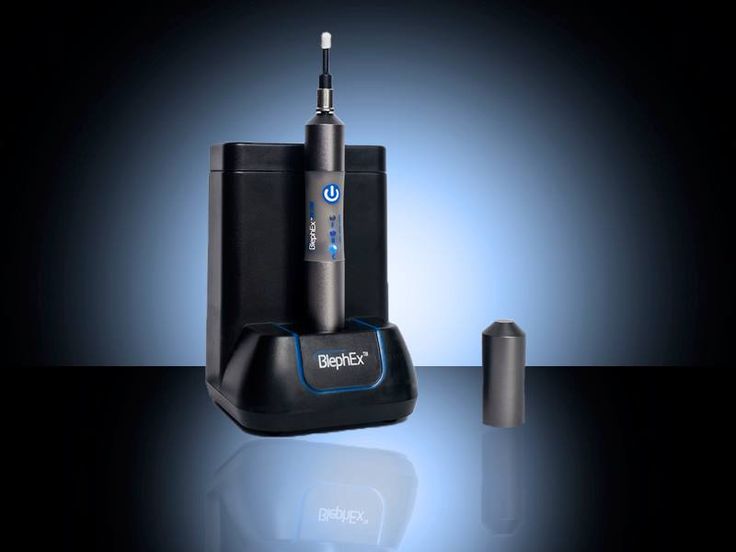
BlephEx treatment
This innovative procedure uses a specialized device to gently exfoliate the eyelids and remove debris and bacteria that can contribute to dry eye symptoms. By thoroughly cleaning the eyelids, BlephEx helps improve tear production and quality, leading to relief from dryness and discomfort. Many patients report significant improvement in their symptoms after just one treatment session.
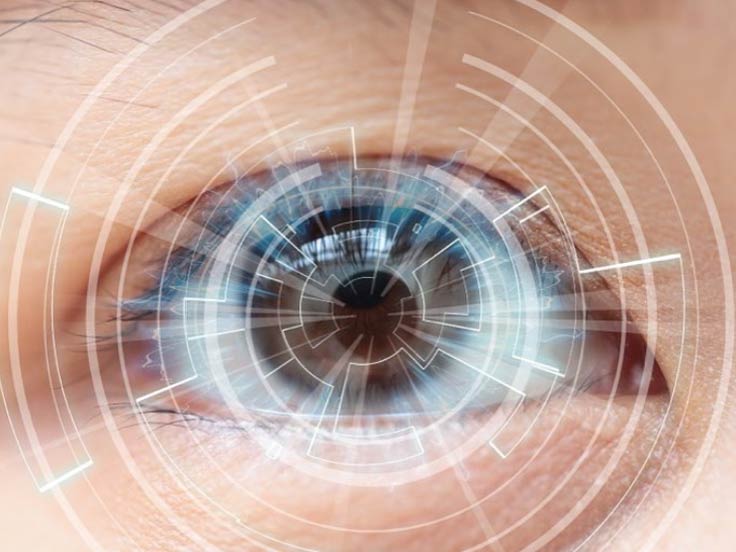
Amniotic membranes
This cutting-edge therapy involves placing a thin membrane derived from amniotic tissue on the surface of the eye. This membrane contains growth factors and proteins that help promote healing, reduce inflammation, and improve overall eye health. Amniotic membrane treatment is particularly effective for patients with severe dry eye or those who have not responded well to other treatments.
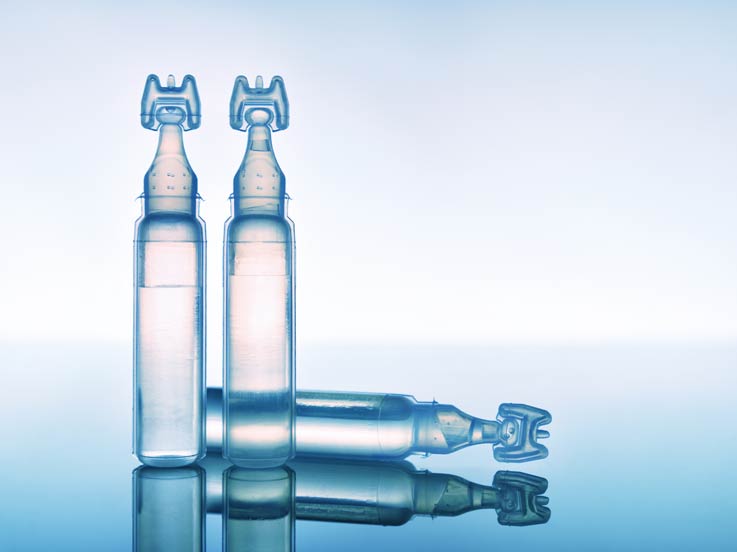
Eye drop therapy
Our eye drop therapy includes advanced formulations tailored to your specific dry eye needs. From lubricating artificial tears to anti-inflammatory solutions and tear-stimulating medications, our optometrists will recommend the best drops for managing and relieving dry eye symptoms effectively.
Schedule your dry eye evaluation
You don’t have to live with uncomfortable dry eye symptoms like red, itchy, watery eyes. While dry eye doesn’t have a cure, treatment can help manage your symptoms and improve your quality of life. If you’re struggling with dry eye, know that our dry eye specialists are here to help. Schedule an appointment for a consultation and put yourself on the path to long-lasting relief.
Our dry eye specialists
Dr. Laura Keller, OD
Dr. Alexandra Couch, OD
Dr. Lark was fantastic! Very informative, reassuring, and thorough. She is the kind of doctor we all wish we would see every time.
Nadeen Kelly
They are truly the best. The ladies at the registration desk are incredibly nice and always have smiling faces. The doctors and their assistants are highly professional. The ladies who handle prescription glasses are exceptionally nice and helpful. A special thanks to Dr. Lark and the amazing eye therapist, Shelly; both are incredibly professional and kind.
Ahmed
Best eye doctors in town. Everyone is friendly, and they take the time to explain everything so you totally understand what is going on. Dr. Zainia is the best!
Kristen Kiley
Adult Eye Exam
Contact Lens Exam
Diabetic Eye Exam
Dry Eye Exam
Pediatric Eye Exam
Specialty Contact Lens Exam
Cataracts
Emergency Eye Care
Glaucoma
LASIK
Macular Degeneration
Myopia Management
Vision Therapy
Eyeglasses
Sunglasses
Children’s Eyewear
Contact Lenses
Avulux Glasses

